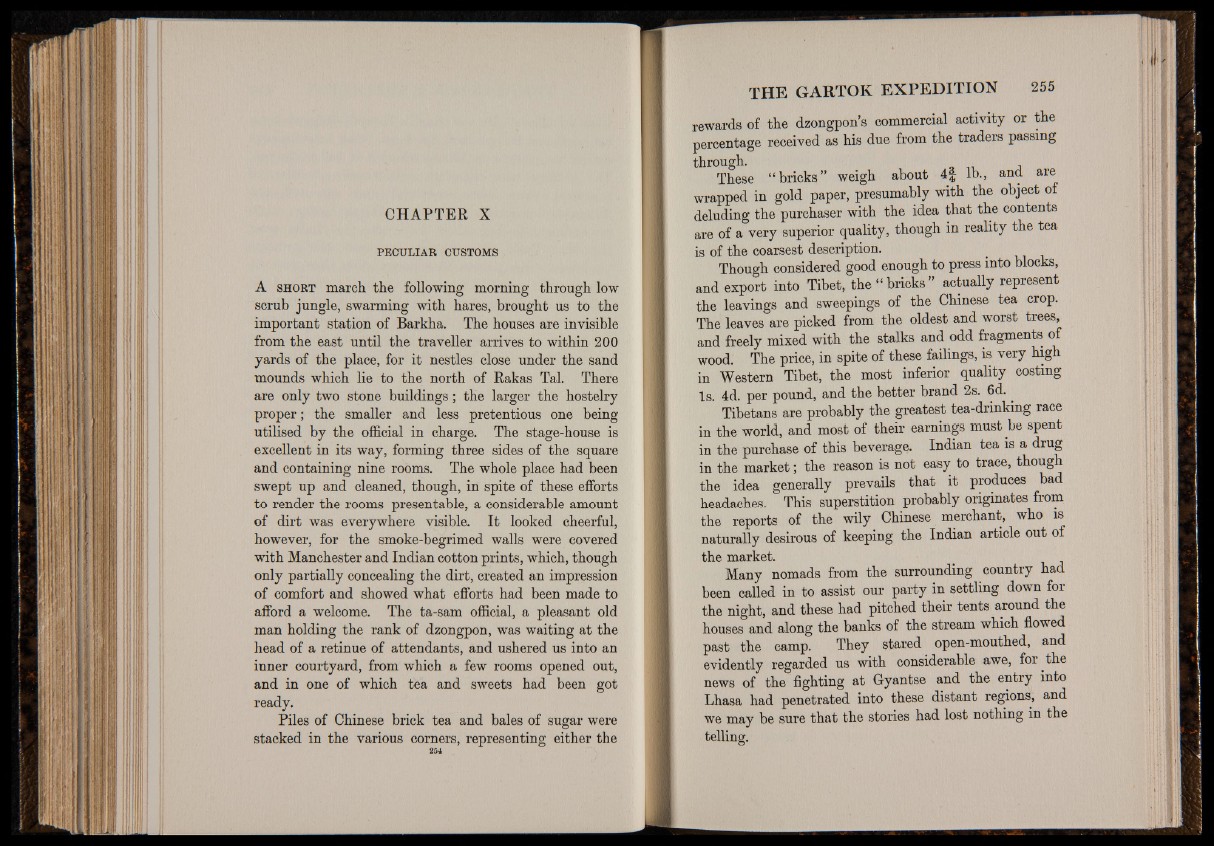
CHAPTER X
PECULIAR CUSTOMS
A sh o r t march the following morning through low
scrub jungle, swarming with hares, brought us to the
important station of Barkha. The houses are invisible
from the east until the traveller arrives to within 200
yards of the place, for it nestles close under the sand
mounds which lie to the north of Rakas Tal. There
are only two stone buildings; the larger the hostelry
proper; the smaller and less pretentious one being
utilised by the official in charge. The stage-house is
excellent in its way, forming three sides of the square
and containing nine rooms. The whole place had been
swept up and cleaned, though, in spite of these efforts
to render the rooms presentable, a considerable amount
of dirt was everywhere visible. It looked cheerful,
however, for the smoke-begrimed walls were covered
with Manchester and Indian cotton prints, which, though
only partially concealing the dirt, created an impression
of comfort and showed what efforts had been made to
afford a welcome. The ta-sam official, a pleasant old
man holding the rank of dzongpon, was waiting at the
head of a retinue of attendants, and ushered us into an
inner courtyard, from which a few rooms opened out,
and in one of which tea and sweets had been got
ready.
Piles of Chinese brick tea and bales of sugar were
stacked in the various corners, representing either the
254
rewards of the dzongpon’s commercial activity or the
percentage received as his due from the traders passing
through.
These “ bricks” weigh about 4 f lb., and are
wrapped in gold paper, presumably with the object of
deluding the purchaser with the idea that the contents
are of a very superior quality, though in reality the tea
is of the coarsest description.
Though considered good enough to press into blocks,
and export into Tibet, the “ bricks” actually represent
the leavings and sweepings of the Chinese tea crop.
The leaves are picked from the oldest and worst trees,
and freely mixed with the stalks and odd fragments of
wood. The price, in spite of these failings, is very high
in Western Tibet, the most inferior quality costing
Is. 4d. per pound, and the better brand 2s. 6d.
Tibetans are probably the greatest tea-drinking race
in the world, and most of their earnings must be spent
in the purchase of this beverage. Indian tea is a drug
in the market; the reason is not easy to trace, though
the idea generally prevails that it produces bad
headaches. This superstition probably originates from
the reports of the wily Chinese merchant, who is
naturally desirous of keeping the Indian article out of
the market.
Many nomads from the surrounding country had
been called in to assist our party in settling down for
the night, and these had pitched their tents around the
houses and along the banks of the stream which flowed
past the camp. They stared open-mouthed, and
evidently regarded us with considerable awe, for the
news of the fighting at Gyantse and the entry into
Lhasa had penetrated into these distant regions, and
we may be sure that the stories had lost nothing in the
telling.